- Home
- Hammond Innes
High Stand Page 9
High Stand Read online
Page 9
‘Won’t be a Jiffy,’ he said as he stopped at one of the houses and jumped out, leaving the engine running. Through the clicking wipers I could see the outline of Parks HQ, a very modern complex with an almost solid glass rotunda that had clearly been built to give a view of the mountain ranges fronting the Park. I wondered what it would look like in the morning, what the trail would be like up to the mine. I might be on my own then, the trail impassable … I suddenly felt very inadequate, sitting there in that warm cab staring out at the grey-black void that masked the mountain slopes. Time passed, the emptiness beyond the last gleam of light accentuated as the black of night descended on the land.
It was probably only about ten minutes before Jim came hurrying back through the ram, but it seemed longer. ‘Well, that’s all fixed,’ he said as he jumped in. ‘I’ll pick you up in the morning about nine. You can then have a look at the Park museum, see the film show — you ought to see that while you’re here, it’s something quite special - then about ten my wife will come for you and drive you to Lakeside.’ We were out on the Highway again, turning away from the Haines road and heading north. ‘The forecast’s good, by the way. At least for tomorrow.’ And he added, ‘I phoned the Lodge, but the Italian hasn’t been in for a couple of days. They expect him any time now, but if he doesn’t turn up they’ve got a four-by-four you can borrow, that’s if the mine road’s drive-able. Okay?’
I thanked him, still surprised that he should be taking so much trouble over a perfect stranger, and a moment later we swung right onto the gravel forecourt of a filling station, lights shining dimly on a ribbed and riveted battle-wagon of a coach nose-on to a wooden building that said it was a restaurant. ‘That’s the Greyhound bus in. This is their meal stop-over.’ He parked beside it and I saw the words Anchorage-Whitehorse.
The passengers were just starting to return to their seats as we pushed our way into the entrance, which was part shop selling souvenirs and paperbacks. They had a room spare and as soon as I was booked in Jim left me. He had two kids and he was in a hurry to get back to them. ‘See you in the morning,’ he called, and I stood there on the wooden steps, watching his tail lights disappear in the rain, American voices all around me, Anchorage just a bus ride away.
I picked up my case and hurried across to the accommodation unit. The room I had been given had the heating turned full on. The window looked out onto the gravel forecourt and the parked cars and trucks of other guests. Right below me was a truck with what looked like a snow vehicle in the back, the word SKI-DOO just visible. It also had something roped to the left front mudguard and largely hidden under a plastic sheet, only its legs showing like stiff sticks. It was the carcass of a deer, its dainty little hoofs shining blackly in the forecourt lights.
The Greyhound bus left and I had a quick shower before running back through the ram to the restaurant, where I had my meal in the company of what seemed an inordinate number of stuffed animals and head trophies. As usual when feeding out on my own I had a book with me, so that it wasn’t until a man jogged my elbow as he pushed past on his way to the toilet that I took any notice of the two seated under an elk head in the far corner. He was a small dark man in an ex-army camouflage anorak and a peaked cap. He didn’t apologize, which is perhaps why I watched for him to come out. He had the walk of a man who thought he owned any piece of ground his feet were treading on, the arrogance of his movements reflected in the hardness of his features, the unyielding set of his jaw. His eyes met mine, very briefly, then darted away to take in the whole room so that I had the impression he was constantly on the alert. His companion was bigger, burlier, his beard and moustache streaked with grey, the nose broad and flat, almost negroid, except that his colouring was lighter. He had the build, the bullet head and thick neck, and the ears of a heavy-weight boxer, and he, too, wore a camouflage anorak, but his hat was of fur with a bit of a tail. It lay on the table beside his coffee cup and his partially bald head shone in the fluorescent light.
They had already finished their meal and they left shortly afterwards. I watched them through the window as they walked across to the truck with the dead deer roped to its bonnet, got in and drove away towards Haines Junction. I finished my meal, and when I went back to my room the rain had stopped and a star or two was visible over the black outline of the mountains. Being on my own I had drunk too much coffee, so that for a long time I couldn’t get to sleep. Perhaps it wasn’t so much the coffee as the thought that I was very near now to the object of my journey. Tomorrow I would be at the Lodge where Miriam had stayed, where she had written that postcard, and the next day I’d probably be at the mine. I thought a lot about Miriam. Every now and then the headlights of a vehicle coming from Haines Junction swept across the curtained windows. For some strange reason I couldn’t get those two men out of my mind. One short and treading daintily, the other large, with a bullet head and a slow, deliberate walk, both of them sallow-skinned, almost dark, with a watchfulness that made them somehow different from any of the Canadians I had seen since arriving at Vancouver Airport.
It must have been well after midnight that the headlights of a vehicle beamed onto my window, growing so bright that the whole room was illuminated as the scrunch of tyres on gravel and the noise of an engine approached. It stopped, the engine was cut and suddenly the room was black again. The slam of doors, the sound of men’s voices gradually fading, and a moment later footsteps in the passageway outside, the fumbling of a key in a lock. They were in the room next to mine and I could hear their voices. They were blurred, of course, by the wooden partition wall, but still quite audible, and yet I couldn’t make out a word they were saying. I must have been listening to them for several minutes before I realized they weren’t speaking English, but some language that was foreign to me.
Curiosity, and the need to relieve myself, got me out of bed. I went to the window and pulled back the curtain. The truck with the dead deer was back, parked right below me, the stiff sticks with hoofs on the end looking macabre in the light of a young moon. Beyond the highway the mountains of the Front Ranges were a black wall blotting out half the sky, and high up the blackness changed abruptly to a brilliant mantle of white. I went into the toilet and shower cubicle, the voices lower now, hardly more than a murmur. And when I had flushed they ceased altogether.
The truck was gone in the morning and the sun shone out of a blue sky. I was packed and coping with a greasy plateful of bacon and eggs when Jim Edmundson arrived. ‘You got a nice day for your trip to Dezadeash Lake,’ he said. ‘Jean’s looking forward to it herself. And if the weather holds over tomorrow the track up to the mine should be okay.’ Later, as we drove into Parks HQ, he said, ‘Those hunters, by the way, they’re booked in again at Lakeside Lodge. I checked with Kevin while you were getting your bag. So just be careful. Some of them are a bit trigger-happy, shoot at anything that moves. Last year we had a guy from ‘For onto come through, two guns, all the right permits, and the bugger goes and shoots a pony, says he thought it was a bear coming at him out of the bush. Can you beat it?’ He didn’t like hunters. ‘If I had my way I’d ban shooting altogether. But up here game is about all we got to attract the visitors and keep the money rolling in. Still, if you’d come into the Yukon with a gun, I wouldn’t be giving you a lift, that’s for sure.’
He left me in the Exhibition Centre. ‘I got work to do.’ And he added, ‘I laid on the film presentation. The man who runs it will be with you at nine-thirty. It lasts twenty-seven minutes and by the time it’s over Jean will have the car waiting for you outside. Okay?’
That morning, with the sun shining and in the dazzling white of fresh snow spread over the tops of the mountains like sugar icing, the view from the Centre’s big windows was breathtaking. So, too, was the film show. There were perhaps a dozen tourists seeing it with me, but for the half-hour I was in that darkened room I wasn’t aware of them. The slides thrown on the wall-screen by six projectors took me into a world as remote as that which I had looked d
own on during the flight across the top of the North American continent. Ice and snow and glaciers, the thaw and running water, rare flowers opening with the sun, small animals rearing young, the aurora and the winter’s grip on frozen peaks — I sat transfixed by a glimpse into something so primeval, so terrible in its cold beauty, that the human race and all its problems, the reason for my own presence here at an intersection of the Alaska Highway, everything seemed of no account, as though I were at the birth pangs of the world, living the Creation.
Then suddenly it was over and the lights came on. I was back in the Parks Headquarters, the real world breaking in on me with the appearance of a small, plump woman with a smiling face. ‘You’re Philip Redfern, aren’t you?’
I nodded, my mind still dazed by the wild remoteness of what I had just been shown.
‘I’m Jean -Jean Edmundson. I’m taking you to Dezadeash, that’s right, isn’t it? Jim said to take you to the Lodge there and introduce you to Kevin McKie. He owns the place.’ And she went bubbling on about Jim having to go over to Destruction Bay, the Mounties having had a report of somebody with a gun stalking Dall sheep up on the mountains above Lake Kluane. She pushed open the doors and led me out to where her car was parked. ‘I’d have been here earlier only I have to take my little boy to school, he’s too young to go on his own yet, and then there’s the usual household chores. It’s nice to have an excuse to drive over to Dezadeash. It’s a lovely run, all along the Front Ranges.’ She flung open the car door. ‘And such a beautiful morning, too, after all that rain, and the snow on the mountains. Jim says the winter will be early this year. Jim’s usually right about the weather. Six years he’s been a warden here. Six years next March. Before that we were with the Forestry Service. We had a lovely little doll’s house of a place just out of Port Hardy on the Beaver Harbour road. Jim’s done all sorts of things, but this is the job he likes best. I guess he’ll stay with the Kluane Parks now, and I don’t mind it — as long as he’s happy …‘She prattled on as she drove out to the High way and turned left where a sign showed the Haines Highway breaking off from Alaska Highway No. i, which was the road to Anchorage.
We passed a police post and a Met. station, a few other buildings, and then there was nothing but the road stretching ahead through spruce and scrub with the Front Ranges a towering 8000-foot rampart to our right, the autumn colouring of the upper slopes gold and red in the sunlight, changing to the crystal white of new snow on the tops. I wondered what it had been like when Miriam had driven to Lakeside Lodge along this same highway - had she felt any sense of unease? I wished the woman would stop talking. I would have liked to consider whether there was any real justification for the tension that was growing in me — or was it just my imagination? Why should that slide show have affected me so? It was as though I had been given a glimpse into the cold realities of the world beyond, the things I couldn’t quite grasp - dust-to-dust, city lights and offices all transmuted into the glacial cold of life after death, a nuclear winter …
Perhaps I was tired. Perhaps it was the jet-lag that some people talk about, or was it the spirit of this far northern country entering my soul — or was it premonition?
‘Jim said to be sure and show you our rock glacier. You ever seen a rock glacier, Philip?’ The car slowed and we turned right into a parking area. ‘You can just see it above the spruce there.’ She pointed to a long brown gash in the scrub-covered slopes that looked like scree, except that it was heavier stuff, all boulder and rock. ‘Come on, I’ll show you.’ She was bouncy and full of energy, her eyes alight with a girlish enjoyment of life, the whites bright with the health that radiated from her. ‘Come on, this way.’ She plunged into a forest of spruce on a beaten path that became a boardwalk where it crossed an area of swampland. Then we were climbing sharply up until we reached the edge of the slide, which towered above us like the decayed remains of a gigantic stone fortress. ‘It moves just like a glacier, very slowly, but never really stopping. I don’t understand the mechanics - boulder on an ice-polished rock surface underneath, I suppose. You must ask Jim. He’ll explain.’
The boulder and rubble ran in a long sweep high above me. ‘Is this anything like a placer mine after they’ve got the gold out?’ I asked her.
‘I don’t know,’ she said. ‘I’ve been here six years, but all the Kluane mines are closed now. They’re not allowed to mine gold or anything else, not in the Park area.’
Feet had worn a path in the rock to a viewpoint. When I reached it I could see the road stretching away to the southeast and in the distance the gleam of water. ‘That’s Dezadeash Lake,’ she said.
Less than an hour later we were at the Lodge and Kevin McKie was telling me there was no way I could get up to the mine. ‘There’s been a slide and the track’s impassable.’ He advised me to return with Jean Edmundson to Haines Junction and forget all about Ice Cold Creek. ‘It’s finished. Tom knew that, so what’s the point?’
‘I just wanted to be sure,’ I said, watching his hands. We were in the restaurant and they were gripped tight on the edge of the long counter.
‘It surely don’t need a lawyer visiting the mine to confirm the gold’s run out. How would you know anyway? Besides,’ he added, ‘everyone from here to Whitehorse, all the way down to Haines I guess, knows Jonny hasn’t been running anything but a token mine for years.’
‘Then I’ll stay and talk to some of them.’ He didn’t want me there, and I wondered why. ‘Jim Edmundson said he’d fixed a room for me.’ He couldn’t refuse, for he still had his Vacancy sign out on the edge of the highway. ‘And if somebody would lend me a pair of boots, then drive me as far as the slide, I could walk the rest.’
He shook his head. ‘Not on your own. Too risky. Suppose you met a moose or a grizzly… Anyway, my truck’s out of action.’ He said it was probably a half-shaft gone, but I didn’t believe him.
‘Then I’ll wait for Tony Tarasconi to come in.’
He didn’t like that. ‘He has his own axe to grind.’
‘I haven’t come all this way,’ I told him, ‘to be turned back now.’
He hesitated, then shrugged. ‘As you please.’ He signed me in then and the book showed that Tarasconi was already at the Lodge. He had cabin No. 3 and had presumably arrived that morning. Two other names had also been entered for the same date - Camargo and Lopez. ‘Spanish?’ I asked. ‘No, South American,’ he replied. ‘We have quite a number of South American gentlemen come to the Yukon for the hunting.’
2
Because a lawyer spends so much of his time dealing with the vagaries of human nature, I suppose the suspicious element that is in all of us becomes highly developed. It is an exaggeration, of course, to say that McKie’s reception of me was hostile, but that is how I felt about it at the time. I had the impression he was trying to conceal something from me, and if I could only get hold of a vehicle I would find no slide and the road to the mine open.
I didn’t have a chance to think about it then. Jean Edmund-son stayed to lunch and throughout the meal her chatter was a distraction, which, oddly enough, I missed as soon as she had gone, for she had talked about ordinary things and her vitality had been infectious. I felt suddenly at a loss then, for I was on my own with no vehicle, and in the Yukon without a vehicle is about the same as being a knight without a horse.
I walked down to the lake where planks led out to a little boat stage. A heron rose, evacuating a white jet as it struggled to gam height. The sun was warm, the ground still frosted in the shadows. Back at the Lodge I wandered round the sheds at the side. There was a truck there with a jack under the back wheel, but nobody working on it. In the generator housing I found a blond-bearded giant of a man in an elaborate Indian jacket pumping diesel fuel from a drum into a tank. I asked him about the truck, but all he said was, ‘Kevin’s the mechanic. Better talk to him about it. I’m just barman and general handyman around here.’ His name was Eddie and when I started questioning him about the track up to the mine, he shook his
head. ‘Sorry, feller, I don’t belong here. I only took this job a couple of weeks back.’
I went to my cabin then, which was last in the line. They were all built of wood with shingle roofs and antlers on the gable ends above a verandah. I lay on my bed and tried to think, haunted by that postcard from Miriam — Will write you again when I get back to Whitehorse. Why the hell hadn’t she? And why had she been able to get up to the mine and not me? I felt confined and frustrated, too restless to stay in the cabin. My time here was precious and I knew I ought to be doing something. But what?
In the end I went out again, taking an old sailing anorak I had with me and the Breton cap I had bought in France. The sun was dropping now towards the mountains, the shadows lengthening as I took a track up the valley behind the Lodge, walking fast. It ran through thickets of aspen and balsam poplar and was signposted to Alder Creek and Mush Lake. I made it to the creek before turning back, and quite why I went that far I don’t know, except that walking helped me to think and I had an instinctive urge to acclimatize myself to the country.
Long before I got back the sun had dropped below the ranges, the track darkening in the shadow of the trees. I heard the generator before I came in sight of the Lodge. The lights were on, several trucks now parked outside the cabins. One of them I recognized, though the dead deer was no longer roped to the mudguard. The Alaskan registration and the ski-doo in the back indicated that they were not locals; they were definitely the same two hunters and it looked as though they would be with me for the evening meal.

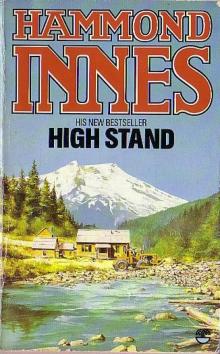 High Stand
High Stand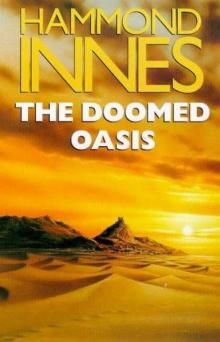 The Doomed Oasis
The Doomed Oasis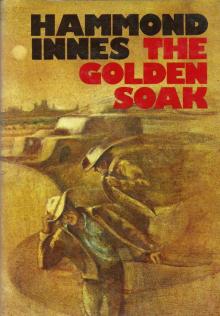 Golden Soak
Golden Soak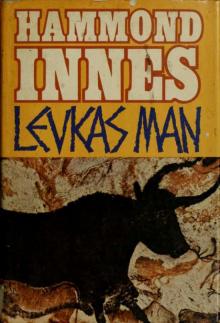 Levkas Man (Mystery)
Levkas Man (Mystery)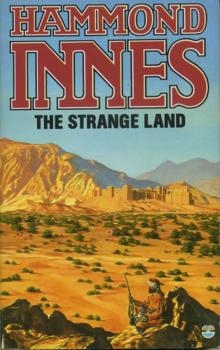 The Strange Land
The Strange Land Dead and Alive
Dead and Alive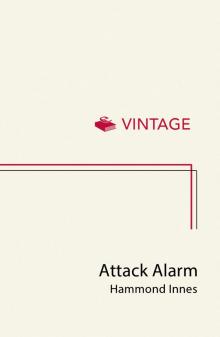 Attack Alarm
Attack Alarm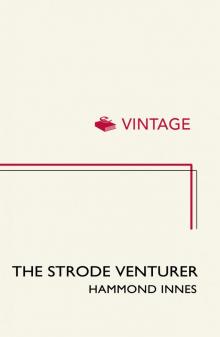 The Strode Venturer
The Strode Venturer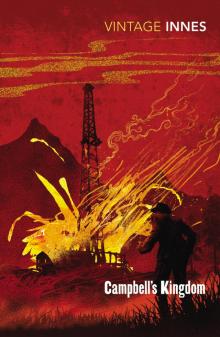 Campbell's Kingdom
Campbell's Kingdom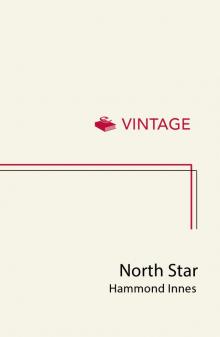 North Star
North Star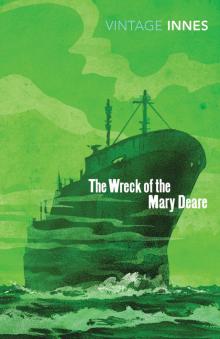 The Wreck of the Mary Deare
The Wreck of the Mary Deare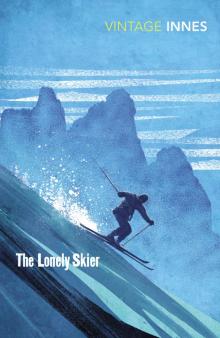 The Lonely Skier
The Lonely Skier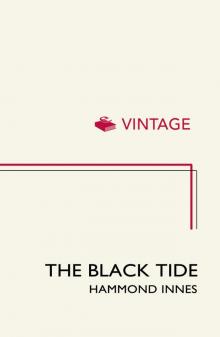 The Black Tide
The Black Tide The Trojan Horse
The Trojan Horse Medusa
Medusa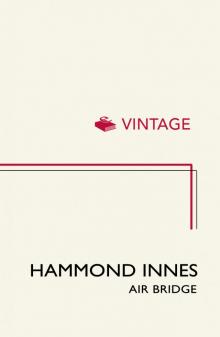 Air Bridge
Air Bridge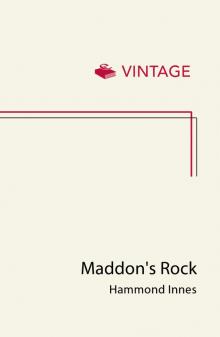 Maddon's Rock
Maddon's Rock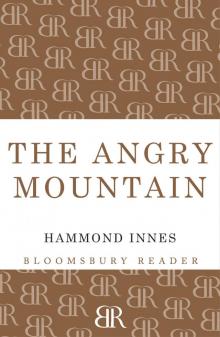 The Angry Mountain
The Angry Mountain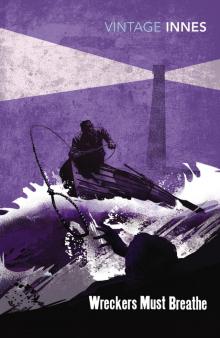 Wreckers Must Breathe
Wreckers Must Breathe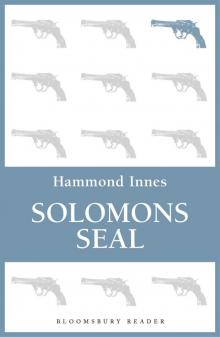 Solomons Seal
Solomons Seal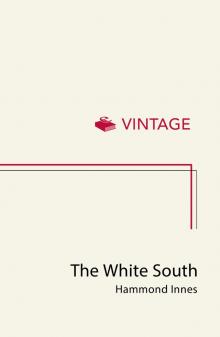 The White South
The White South